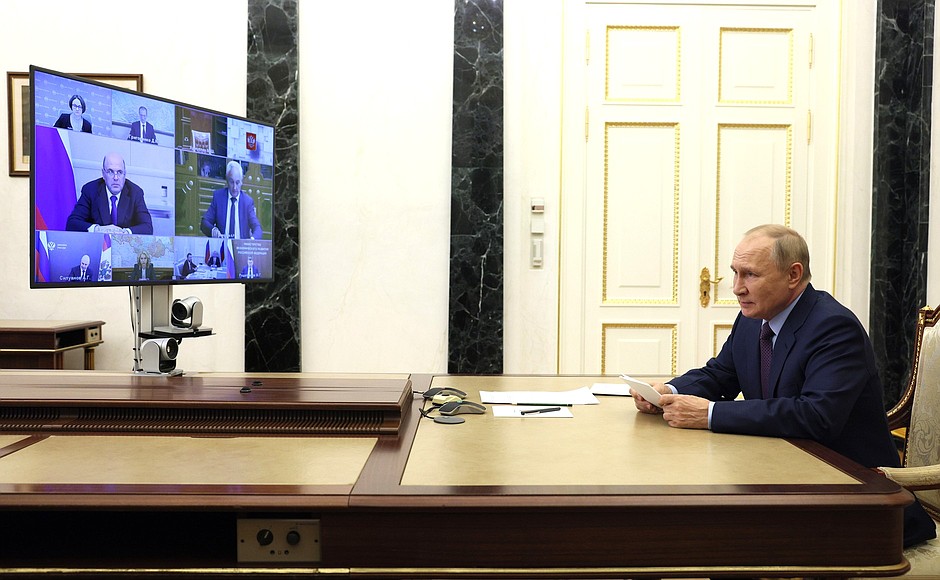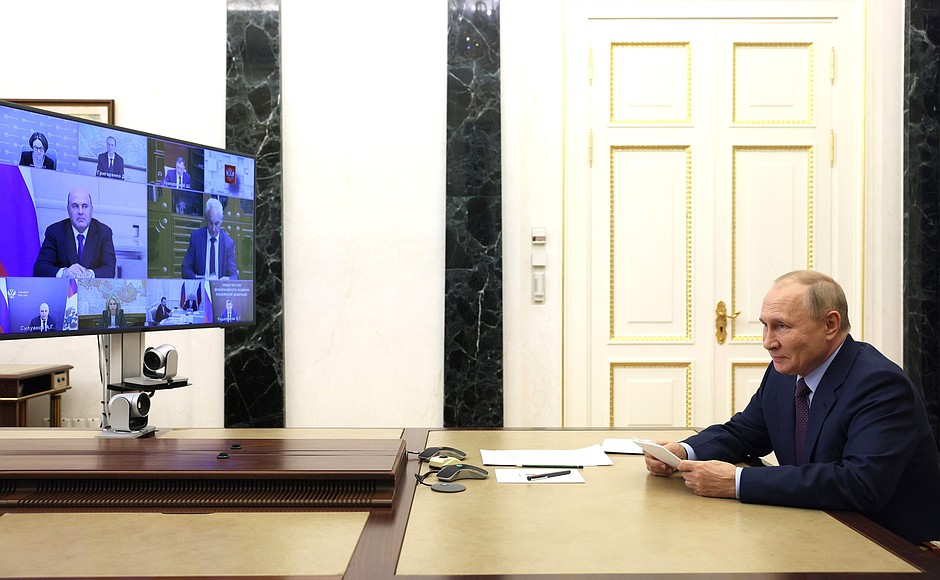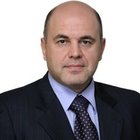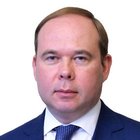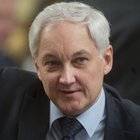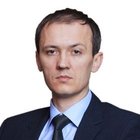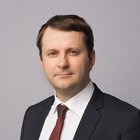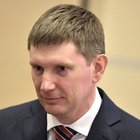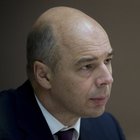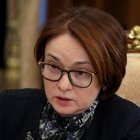Taking part in the meeting were Prime Minister Mikhail Mishustin, Chief of Staff of the Presidential Executive Office Anton Vaino, First Deputy Prime Minister Andrei Belousov, Deputy Prime Minister Tatyana Golikova, Deputy Prime Minister – Chief of the Government Staff Dmitry Grigorenko, Deputy Prime Minister Marat Khusnullin, Presidential Aide Maxim Oreshkin, Minister of Economic Development Maxim Reshetnikov, Minister of Finance Anton Siluanov, and Governor of the Central Bank Elvira Nabiullina.
* * *
Opening remarks at the meeting on economic issues
President of Russia Vladimir Putin: Colleagues, good afternoon,
As agreed, we will discuss the current situation in the Russian economy today, as well as its development prognosis. In fact, we have already been doing this since this morning, with some of our colleagues, including the Prime Minister. Today we will also elaborate draft budgets for 2023–2025. This is important, considering that work on the draft federal budget is being actively pursued, and it will soon be submitted to the State Duma. Naturally, this basic document should fully meet both our priorities and the challenges we are facing.
I would like to emphasise once again that Russia is confidently coping with external pressure, and in fact, we might say, with financial and technological aggression from some countries. The tactics of the economic blitzkrieg, the onslaught they were counting on, has failed, which is already obvious to everyone, and to them too.
We have promptly implemented effective protective measures and launched mechanisms to support key industries, backbone enterprises, as well as small and medium-sized businesses. All of them are aimed at preserving employment and jobs, and providing targeted assistance to our citizens and, above all, families with children and pensioners.
As a result of implementing this complex of measures, we have avoided a sharp decline in the economy. Inflation was also quickly stabilised. After peaking at 17.8 percent in April, it dropped to 14.1 percent, as of September 5. There is every reason to expect that by the end of the year inflation will be about 12 percent. And, as you say, and we are constantly discussing this, our experts in the Executive Office and the Government believe that the downward trend in inflation will continue.
The monthly dynamics of the key indicators also show that the economy is gradually stabilising, adjusting and entering a growth trajectory. Enterprises are returning to a normal schedule.
For example, in July, the industrial output reduced by only 0.5 percent after the June reduction of 2.4 percent. The construction sector even shows growth: by 6.6 percent in July. Overall, the fall in GDP in July slowed to 4.3 percent. In June, it was 4.9 percent.
It is indicative that in August, banks provided more loans to the economy, real sector and population. It is a good sign that shows a growth in economic activity. I consider the generally stable labour market situation a very important achievement by the Government. The situation is more than stable: the unemployment level is at all-time low; in May-July, it was only 3.9 percent.
I ask you, colleagues, to keep this issue under constant review. All the more so as an increasing number of people are at risk of losing their jobs. I want to draw you attention to the fact that there are almost 234,000 employees who are experiencing downtime or who are on forced leave or work part time. This is almost twice as many as at the beginning of the year. Naturally, on the scale of the entire country, this is a small number, but for concrete sectors, enterprises and cities it creates serious difficulties.
In this regard, the Government needs to pay due attention to such local problems and find effective solutions.
We see that the actions of our, to put it mildly, ill-wishers are to a large extent unpredictable and impulsive lately. They are clearly unprofessional and thus impulsive, and this means that we should follow our own logic and keep the initiative. We should not just react to certain unfriendly steps, but consistently reach our development goals in the economy, social sphere and infrastructure. This also concerns the preparation of the draft federal budget.
I have already said that prompt adoption of large-scale anti-crisis measures and the achieved sustainability and strength of the Russian economy in the face of external challenges are largely the result of our joint responsible macroeconomic policy in the past few years
This is why the Russian budget is now doing much better than budgets in the majority of G20 economies and our BRICS friends.
Thus, in August after a relatively “weak” second quarter due to objective factors, the current trend shows that VAT revenues and the collection of other turnover taxes are growing.
As I have already said, today we must discuss in detail budget projections for the next three years.
I will repeat again that the focus on the development and implementation of national projects in the interests of our people must be an unconditional priority. In the process, we must create all the conditions for restructuring the economy, or to be more precise, for its further restructuring, including the implementation of large technological projects, the growth of economic activities, the development of infrastructure in the regions and the creation of new jobs. Naturally, our primary goal is to maintain macroeconomic stability and sustainability.
At this point, we have disagreements and discussions as usual about what we should paid more attention to, where to channel more money or save it and create a safety cushion, and what this “cushion” means when we are going through the inevitable process of dedollarisation. Anyway, let’s return to all these issues that we discuss together during our working meetings almost every day. But the time has come when we must put all of them in a package and move on to drafting the final decisions on the budget process.
Let’s get started, please. Mr Reshetnikov, go ahead.
<…>
